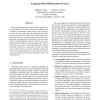Free Online Productivity Tools
i2Speak
i2Symbol
i2OCR
iTex2Img
iWeb2Print
iWeb2Shot
i2Type
iPdf2Split
iPdf2Merge
i2Bopomofo
i2Arabic
i2Style
i2Image
i2PDF
iLatex2Rtf
Sci2ools
112
click to vote
CSFW
2005
IEEE
2005
IEEE
Language-Based Information Erasure
Real computing systems sometimes need to forget sensitive information. This paper explores the specification and semantics of information erasure policies, which impose a strong, end-to-end requirement that information be either erased or made less accessible. Simple lattice-based information flow policies, corresponding to a noninterference requirement, are augmented with the ability to express explicit erasure and declassification policies. Examples are given of applying this expressive policy language to real systems. The paper gives tools for reasoning about policy enforcement either statically or dynamically. Further, the significance of these policies to security is formally explained in terms of trace-based semantic security properties: generalizations of noninterference that accommodate erasure and declassification.
Related Content
| Added | 24 Jun 2010 |
| Updated | 24 Jun 2010 |
| Type | Conference |
| Year | 2005 |
| Where | CSFW |
| Authors | Stephen Chong, Andrew C. Myers |
Comments (0)

